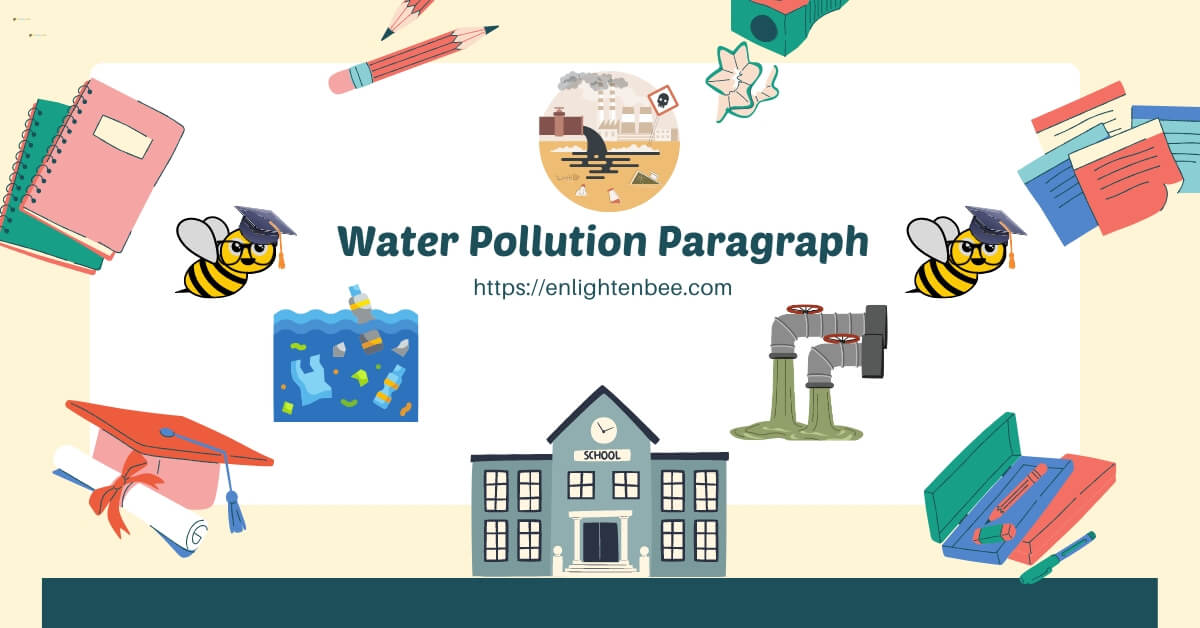1 Water Pollution Paragraph
Water pollution is a big problem around the world. We see it in rivers, lakes, and even our oceans. What is water pollution? It’s when harmful substances, like chemicals or waste, get into the water, making it unsafe for animals and people. Sometimes, factories and farms produce these harmful substances. They can also come from cities and towns where people live. When it rains, the rainwater carries these substances into nearby water bodies. Water pollution harms not just the water animals, but also the birds that eat those animals. In some places, people use this polluted water for drinking or cooking, which can make them very sick. So, it is important to stop water pollution. We can do this by treating waste before we let it go into the water. We can also stop using harmful chemicals. Lastly, we should try to recycle more and throw away less. In this way, we can help keep our water clean for everyone.
Difficult Words for Water Pollution Paragraph:
- Pollution (দূষণ, Contamination): Making something dirty or impure, often in an environmental context.
- Harmful (ক্ষতিকর, Injurious): Causing or capable of causing damage or harm.
- Substances (পদার্থ, Matter): Material with particular physical characteristics.
- Nearby (নিকটবর্তী, Close): Close to or not far away.
- Treat (ব্যবস্থাপনা, Management): To deal with or handle something in a certain way.
- Recycle (পুনঃব্যবহার করা, Reuse): To convert waste into reusable material.
- Throw away (ফেলে দেওয়া): To get rid of something that is no longer useful or wanted.
2 Water Pollution Paragraph
The Earth, our home, is currently grappling with an environmental crisis of grave proportions known as water pollution. This predicament is causing a ripple effect of issues that have a substantial and far-reaching impact on our natural ecosystems and, by extension, human life. Water pollution is largely attributable to an assortment of pollutants that find their way into our life-sustaining water bodies, including but not limited to rivers, seas, and lakes. These contaminants range from harmful chemicals to everyday garbage, originating from diverse places such as industrial factories, agricultural landscapes, and our very own homes. In the event of rainfall, these detrimental substances are often swept off the land and subsequently funneled into water bodies. The ramifications of this widespread water pollution are, in fact, quite dire. This issue does not solely pose a threat to aquatic organisms but extends to terrestrial creatures, including birds and other wildlife, that are dependent on these aquatic beings as a primary food source. Additionally, the human population is at significant risk, considering polluted water, when used for vital activities such as cooking or drinking, can lead to severe health repercussions. As such, it is of paramount importance that proactive measures are taken to curb water pollution. One such remedial action involves the proper treatment and disposal of waste materials from diverse sources prior to their discharge into the water bodies. Furthermore, it is critical to minimize the utilization of harmful chemicals, given their potential to leach into water systems. Advocating for recycling measures and minimizing the generation of waste can also serve as potent strategies to counteract water pollution. By pulling together and implementing these remedial steps, we can make strides towards ensuring a future where our water is not only safe for all life forms on Earth but also contributes to a healthier and more sustainable ecosystem.
Difficult Words for Water Pollution Paragraph:
- Consequences (ফলাফল, Result): The results or effects of an action or condition.
- Contaminating (দূষিত করা, Polluting): Making something impure by polluting or poisoning.
- Swept (সরে যাওয়া, Move away): To be moved or carried swiftly and directly.
- Aquatic (জলজ, Hydrophyte): Relating to water.
- Mitigate (হালকা করা, Lighten up): To make less severe, profound, or painful.
- Discharged (নির্গত হওয়া, Emerged): Allowed or caused to leave.
- Seep (ঝরা, Drop off): To flow or leak slowly through small openings.
- Minimizing (হ্রাস করা, Decreasing): Reducing something to the smallest possible amount or degree.
3 Water Pollution Paragraph
Water pollution, a pervasive and escalating issue, significantly mars the health of our global ecosystems and the quality of human life. The root cause of water pollution stems from the intrusion of deleterious substances such as industrial chemicals, agricultural waste, and everyday garbage into our water bodies such as oceans, rivers, and lakes. More often than not, rainwater acts as a courier for these pollutants, swiftly directing them from their origin points on land into the aforementioned water bodies. This ubiquitous contamination poses grave risks not only to aquatic life but also to terrestrial fauna that rely on these polluted inhabitants as a food source. The ripple effects are further felt by humans who rely on these compromised water bodies for vital activities such as drinking, cooking, and irrigation. Therefore, the importance of curbing water pollution cannot be overstated. A viable solution hinges on the appropriate treatment of waste materials, drastically reducing the use of damaging chemicals, and robust promotion of recycling. By espousing these eco-friendly practices, we can stem the tide of water pollution, ensuring the perpetuation of a healthy ecosystem for future generations.
Difficult Words for Water Pollution Paragraph:
- Pervasive (সর্বব্যাপী, Omnipresent): Spreading widely throughout an area or a group of people.
- Escalating (বাড়ানো, Increase): Increasing rapidly.
- Deleterious (ক্ষতিকর, Harmful): Causing harm or damage.
- Intrusion (হস্তক্ষেপ, Interference): The act of intruding.
- Courier (বাহক, Bearer): A person or company that transports goods or messages.
- Ubiquitous (সর্বব্যাপী, Encyclopaedic): Present, appearing, or found everywhere.
- Compromised (আপস, Adjust): Weakened or jeopardized.
- Hinges (নির্ভর করা, Rely): Depend entirely on.
- Espousing (গ্রহণ করা, Accept): Adopting or supporting a cause or way of life.
- Perpetuation (চিরস্থায়ী করা, Eternal): Making something continue indefinitely.
4 Water Pollution Paragraph
At a time when environmental problems are growing exponentially, the issue of water pollution commands our undivided attention. This problem arises due to the widespread contamination of our indispensable water bodies – be it the oceans, rivers, or lakes – by deleterious elements like domestic and industrial waste, toxic substances, and harmful chemicals. These pollutants have varied origins, including industrial plants, agricultural sites, and even our homes. Rainwater acts as a catalyst, sweeping these harmful elements off the land and directing them into the water bodies, turning water pollution into a pressing worldwide issue. The repercussions of this contamination are extensive and not limited to the boundaries of these water bodies. Aquatic life is the first to bear the brunt of this pollution, but the effects do not stop there. Terrestrial organisms, which depend on these water inhabitants for their nourishment, are also affected. Moreover, humans find themselves in a precarious position as the polluted water, when used for drinking, cooking, or irrigation, can have dire health implications. Given this, mitigating water pollution emerges as a crucial task for preserving the health and vitality of our planet and all life forms it sustains. Fundamental to this endeavor is the implementation of proper waste management strategies, which include the effective treatment and disposal of waste materials, reducing the use of harmful chemicals to a minimum, and amplifying recycling practices. By embracing these strategies and integrating them into our daily routines, we can play a significant role in ensuring the long-term health of our water bodies and, consequently, of all life forms they nurture.
Difficult Words for Water Pollution Paragraph:
- Unswerving (অনড়, Steadfast): Not changing or becoming weaker; steady or constant.
- Pervasive (সর্বব্যাপী, Universal): Spreading widely throughout an area or a group of people.
- Detrimental (ক্ষতিকারক, Prejudicial): Tending to cause harm.
- Terrestrial (পার্থিব, Earthly): Relating to the earth.
- Sustenance (ভরণপোষণ, nourishment): Food and drink regarded as a source of strength; nourishment.
- Imperative (অপরিহার্য, Essential): Of vital importance; crucial.
- Mitigating (হালকা করা, Minimizing): Making less severe, serious, or painful.
- Maximization (বৃদ্ধি করা, Enhancement): The action of making the best or most effective use of a situation or resource.
10 Most Important Paragraphs for All Classes
| # | Paragraph Name | Link |
| 1 | Adolescence Paragraph | Click Here |
| 2 | Deforestation Paragraph | Click Here |
| 3 | Environment Pollution Paragraph | Click Here |
| 4 | Global Warming Paragraph | Click Here |
| 5 | Load Shedding Paragraph | Click Here |
| 6 | Online Class and Traditional Class Paragraph | Click Here |
| 7 | Price Hike paragraph | Click Here |
| 8 | Road Accident paragraph | Click Here |
| 9 | Tree Plantation paragraph | Click Here |
| 10 | Metro Rail Paragraph | Click Here |
Join Our Community on Facebook.









